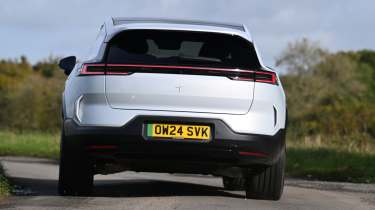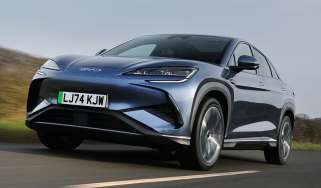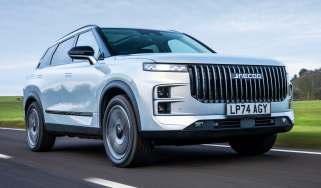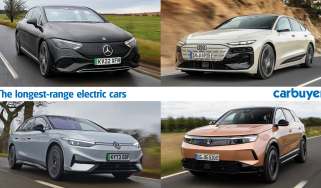Polestar 3 review – upmarket and well-built SUV contender
“The Polestar 3 SUV is a welcome addition to the electric brand’s lineup with a premium, well-built feel”
Pros
- Comfortable and refined
- High-quality and safe interior
- Good electric range
Cons
- Doesn’t feel sporty to drive
- Too many virtual controls
- No single-motor variant from launch
Verdict – is the Polestar 3 a good car?
The Polestar 3 is a well-built, high-quality electric SUV which we think looks great, too. Its minimalist interior exudes a premium feel, albeit in a more understated way compared to many rivals. The ride is comfortable, too, but we think it’s a push to consider the Polestar 3 sporty as per the manufacturer’s claims – sure it’s powerful, but it still feels like a plush SUV to drive. On that basis, we think the more affordable single-motor version will make the most sense for most people, and it gets a mega 438-mile range.
Polestar 3 models, specs and alternatives
The Polestar 3 is a large electric SUV that’s the biggest model produced by the brand so far. The first thing to make clear is that Polestar uses a chronological naming system much like that used by phone companies like Apple, so it’s called the 3 because it arrived after the Polestar 2. That means that despite what you might expect, the Polestar 4, isn’t necessarily bigger – in fact, it’s a smaller coupe-SUV that confusingly sits between the 2 and the 3.
The Polestar 3 made its debut with a ‘Launch Edition’ model which started from around £75,000 and can be had with a ‘Performance Pack’ bringing a higher power figure and slight styling changes. The entry-level single motor version costs from just under £70k, but this is still almost £6k more than the Audi Q6 e-tron.
The Polestar 3 shares many of its underpinnings with the £96k Volvo EX90. In the Polestar, dual motors combined produce 483bhp as standard, but opting for the Performance Pack bumps this up to 510bhp. The single motor version gets 295bhp, but can still dispatch 0-62mph in 7.5 seconds – plenty quick enough for many drivers.
The Polestar 3 also gets a 107kWh battery that gives it a decent range of up to 392 miles in standard dual-motor guise, while the Performance Pack sacrifices some of this in the name of power, so it’s capable of up to 348 miles to a charge. While those figures are very usable, the Polestar 3 isn’t particularly efficient considering the large size of its battery. Still, the single-motor variant boasts a range of up to 438 miles, which is seriously impressive.
Safety is a strong selling point for the Polestar 3, and it boasts the highest 93% child occupant protection score of any model Euro NCAP has tested in nearly a decade.
| Trim levels | Power options |
|
|
Range, charging & running costs
A massive 107kWh battery and official range figure of up to 438 miles look impressive, but we managed quite a bit less during our testing. Still, a heat pump is standard for better cold-weather efficiency and it can charge very quickly. Read more about the Polestar 3's range, charging & running costs...
Electric motor, drive & performance
Even the most affordable Polestar 3 packs almost 300bhp, so stepping up to the Dual Motor or Performance Pack version only adds to its performance while also bringing all-wheel drive. Despite its size and weight, the Polestar handles well and rides smoothly thanks to its adaptive suspension setup. Read more about the Polestar 3's electric motor, drive & performance...
Interior & comfort
As we’ve come to expect from Polestar, the interior is minimalist but attractive with some novel uses of sustainable materials – don’t expect lashings of leather. A large portrait touchscreen takes care of most of the car’s functions, but there’s also a smaller display behind the steering wheel. Read more about the Polestar 3’s interior & comfort…
Boot space, practicality & dimensions
It might be quite a bit lower than some rivals, but the Polestar 3 is still a big car with lots of space for passengers. It misses out on the seven seats of the similar Volvo EX90 though, sticking with five seats and lots of legroom instead. Things aren’t quite as rosy when it comes to luggage space as the Polestar 3 has a relatively shallow boot for the class. Read more about the Polestar 3’s boot space, practicality & dimensions…
Reliability & safety
The Polestar 3 shares its underpinnings with the Volvo EX90, so its five-star Euro NCAP score should come as no surprise given Volvo's reputation for safety. Its credentials include 10 airbags and a host of exterior sensors to detect the world around the vehicle. Read more about the Polestar 3’s reliability & safety…
Polestar 3 alternatives
The Polestar 3 goes up against some well-established premium brands which now also offer electric SUVs, such as those from BMW, Mercedes and even Volvo, which was until recently Polestar’s parent company.
Should you buy a Polestar 3?
The Polestar 3 is a great electric SUV that offers a well-built, premium interior, lots of equipment, and a comfortable ride. Its range is very impressive thanks to a large battery, too, and we think it looks unlike a lot of other cars on the market at the moment, which will appeal to buyers after something a little more left-field compared to the Audi Q6 e-tron, BMW iX or Mercedes EQE SUV.
The problems arise when it comes to the driving experience which Polestar insisted would feel sporty. Despite the car’s high power output in standard and Performance Pack guise, it still feels like a large and heavy SUV with a serious turn of speed. That means it doesn’t quite differentiate itself from the Volvo EX90 in terms of a USP, although a cheaper list price does make the Polestar 3 slightly more accessible (although it’s still an expensive car).
On that basis, the more affordable single-motor version of the Polestar 3 offers the best value, given that the dual-motor variants that launched first fail to offer much in the way of sportiness.
What is the best Polestar 3 for low running costs?
As well as a lower list price, the single-motor variants of the Polestar 3 serve up lower running costs and the best range too.
What is the best Polestar 3 for keen drivers?
Opt for the Dual Motor Performance version and power is boosted to 510bhp, so the big Polestar 3 can leap from 0-62mph in 4.5 seconds. Clutches can send more power to the outside wheels, helping to push the car around corners for extra agility.
What is the Carbuyer pick of the Polestar 3 range?
Considering the fact the Polestar 3 looks similar in every trim and comes fitted with a host of features and technology, we’d stick with the entry-level Long Range version. It still feels brisk enough and has the best range figure.
How we tested the polestar 3
We tested the Polestar 3 in Madrid, Spain in June 2024, before driving it on British roads in October.



















